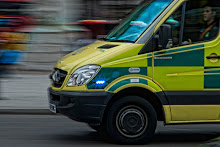We arrived at the scene of some recent domestic violence. We had a face vs. fist (our customer), and an alcohol fueled face vs. fence (coppers customer).
Both parties were intoxicated, one scared, the other violent. Even the neighbours were drunk, aggressive and threatening to join in. The whole situation was touch and go, so we did just that, and stopped around the corner for some treatment.
- Note to self: If you don't feel comfortable, just leave.
Ooooh you know it sounds so obvious, but you kinda feel paralyzed in the first-of-a-kind job. Won't happen again, next time I'll be in and running out of there like a good curry...
A few transfers down the track we get called out to someone who requested an ambulance, but then hung up (so our communications centre told us). Then some further information seeped through, apparently our patient was having seizures. And surely, there was something going on neurologically, something in her brain was not quite right.
On arrival she was quivering, like a mountain of jelly, not communicative, and apparently with a known hypersensitivity to Midazolam, which is a drug which may be given to those unfortunate enough to suffer from prolonged seizures.
Not much we could do, but get her to hospital, due to her size we needed another ambulance for lifting.
What did I learn out of this? Not much, but I did see my first pseudoseizure, and realized that if you really want to, you really can. Can tolerate a semi rigid 15 cm tube stuck down your nose. Can tolerate a 10 cm rigid piece of plastic stuck in your mouth. And even tolerate this down your throat...even if only for 10 seconds at a time (the video get's interesting at ~1:30) Pretty impressive, and every mans dream :-)
The night ended with two call outs, just lifting elderly gentlemen off the floor. Easy, especially in this case due to the fact that a) they both refused hospital, b) they were in palliative care and wanted to die at home, c) their doctors were going to see them the following day anyway.
We got offered a cup of tea at both jobs, very nice - but I don't drink tea and we did have to pop ourselves back in to bed (it was 2am and 4am).
On a side note: a couple of us met up for drinks on the weekend, was good seeing people out of uniform and being able to talk without having the next call in the back of my mind. Even some of the ED staff came along and turned out to be pretty cool people. I must say this job (and related professions) attract some really interesting people.
But they all figured out that I have a background in IT. I am, and always will be, a bit of a geek :-)


